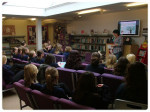Delphine de Vigan
No et moi, translated by George Miller
(Bloomsbury Children’s Books)
Lou Bertignac is a high-IQ 13 year-old stuck in a class of 15 year-olds. The only student who deigns speak to her is 17 year-old Lucas, a rebel with a soft heart who she and all the other girls find irresistible (for those who do not know, the French education system does not do differentiation in the classroom: if you are struggling, you get kept back a year, sometimes two or three times in your school career. If you are gifted you are moved up a year, sometimes two. So having a 13 year-old and a 17 year-old in the same class is certainly not unheard of). Lou is painfully shy, feels socially and physically inept and has to deal with painful circumstances at home: her mum suffers from deep-rooted depression and her dad, despite running the house and being seemingly in control, “cries secretly in the bathroom”. We find out later that the tragic loss of Lou’s sister is at the heart of the family’s emotional turmoil.
When Lou’s teacher Mr Marin forces her to choose a subject for a presentation, she feels backed into a corner, terrified at the idea of standing in front of her classmates. and blurts out homelessness. After all she spends a lot of time people-watching in Austerlitz railway station and there is no shortage of homeless people there. This is where Lou meets No, a young homeless girl who soon becomes the main focus of her study. When Lou first approaches her, it is as if she has to tame her first, and entices her with food, money and the warmth of a café but after many awkward encounters, a strong friendship develops between the two girls. When Lou’s project is completed, she cannot bear to leave No on the streets and ask her parents to take her in. But while No’s presence seems to help heal Lou’s family, it becomes soon obvious that No herself cannot be mended.
No and Me was published as an adult novel in France. Although this might seem odd as the book is primarily about a group of teenagers, I actually think that this is more an adult book than a teenage book, and although it will undoubtedly appeal to some young adults, the subtlety of the text might be lost on many, or indeed put them off altogether. Still, this is a beautiful text, which I thoroughly enjoyed. Those three teenagers are brought together, unbeknown to them, by their abandonment of their mothers and although there are reasonably happy endings for middle-class Lucas and Lou, there is no happy ending for No. This helps keep the text realistic, which I think is fundamental when broaching a subject such as homelessness, and anybody who has visited France will know that homelessness is a huge problem there. But there are other issues in this book as well: addiction and its effect on others, coming-of-age (Lou is an interesting narrator to say the least, and it is particularly poignant to see events unfold through her eyes) and the meaning of home and family; after all Lou has both and yet feels as homeless, if not more, as No.
A great text, but definitely, in my opinion, for the more sophisticated reader.





